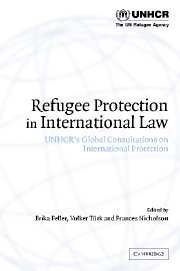Book contents
- Frontmatter
- Contents
- List of annexes
- Notes on contributors and editors
- Foreword
- Preface
- Acknowledgments
- Expert roundtables and topics under the ‘second track’ of the Global Consultations
- Table of cases
- Table of treaties and other international instruments
- List of abbreviations
- Part 1 Introduction
- Part 2 Non-refoulement (Article 33 of the 1951 Convention)
- Part 3 Illegal entry (Article 31)
- 3.1 Article 31 of the 1951 Convention Relating to the Status of Refugees: non-penalization, detention, and protection
- 3.2 Summary Conclusions: Article 31 of the 1951 Convention, expert roundtable, Geneva, November 2001
- 3.3 List of participants
- Part 4 Membership of a particular social group (Article 1A(2))
- Part 5 Gender-related persecution (Article 1A(2))
- Part 6 Internal protection/relocation/flight alternative
- Part 7 Exclusion (Article 1F)
- Part 8 Cessation (Article 1C)
- Part 9 Family unity (Final Act, 1951 UN Conference)
- Part 10 Supervisory responsibility (Article 35)
- Index
3.2 - Summary Conclusions: Article 31 of the 1951 Convention, expert roundtable, Geneva, November 2001
Published online by Cambridge University Press: 28 August 2009
- Frontmatter
- Contents
- List of annexes
- Notes on contributors and editors
- Foreword
- Preface
- Acknowledgments
- Expert roundtables and topics under the ‘second track’ of the Global Consultations
- Table of cases
- Table of treaties and other international instruments
- List of abbreviations
- Part 1 Introduction
- Part 2 Non-refoulement (Article 33 of the 1951 Convention)
- Part 3 Illegal entry (Article 31)
- 3.1 Article 31 of the 1951 Convention Relating to the Status of Refugees: non-penalization, detention, and protection
- 3.2 Summary Conclusions: Article 31 of the 1951 Convention, expert roundtable, Geneva, November 2001
- 3.3 List of participants
- Part 4 Membership of a particular social group (Article 1A(2))
- Part 5 Gender-related persecution (Article 1A(2))
- Part 6 Internal protection/relocation/flight alternative
- Part 7 Exclusion (Article 1F)
- Part 8 Cessation (Article 1C)
- Part 9 Family unity (Final Act, 1951 UN Conference)
- Part 10 Supervisory responsibility (Article 35)
- Index
Summary
The discussion during the first day of the Geneva expert roundtable was based on a background paper by Guy Goodwin-Gill, Professor of International Refugee Law at the University of Oxford, entitled ‘Article 31 of the 1951 Convention Relating to the Status of Refugees: Non-Penalization, Detention and Protection’. In addition, roundtable participants were provided with written contributions from Michel Combarnous, International Association of Refugee Law Judges (IARLJ), Frankie Jenkins, Human Rights Committee of South Africa, as well as the Refugee and Immigration Legal Centre in Melbourne, Australia. Participants included twenty-eight experts from eighteen countries, drawn from governments, NGOs, academia, the judiciary, and the legal profession. Rachel Brett from the Quaker United Nations Office in Geneva moderated the discussion.
The round table reviewed the extensive practice of States in regard to refugees and asylum seekers entering or remaining illegally, many of whom fall within the terms of Article 31 of the 1951 Convention. It took account of the origins of this provision in the debates in the United Nations in 1950, and in the Conference of Plenipotentiaries held in Geneva in 1951. It noted the intention of the drafters of the Convention to lay down, among others, a principle of immunity from penalties for refugees who, ‘coming directly from a territory where their life or freedom was threatened in the sense of Article 1, enter or are present … without authorization, provided they present themselves without delay to the authorities and show good cause for their illegal entry or presence’.
- Type
- Chapter
- Information
- Refugee Protection in International LawUNHCR's Global Consultations on International Protection, pp. 253 - 258Publisher: Cambridge University PressPrint publication year: 2003
- 1
- Cited by



